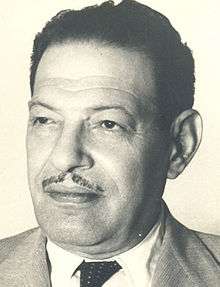Naguib el-Rihani
Naguib el-Rihani (Arabic: نجيب الريحاني; January 21, 1889[1][2][3] – June 8, 1949) was an Egyptian actor. He was born in Bab El Shereya, Cairo, Egypt to an Assyrian father from the city of Mosul in Iraq named Elias El Rihani. His father worked as a horse expert and trader and eventually settled in Cairo, where he met and married Naguib's mother, a Coptic Egyptian woman from Cairo. He was one of three sons that his parents would have together. He was educated in the French school "Les Frères" in Cairo.
Naguib el-Rihani نجيب الريحاني | |
|---|---|
نجيب الريحاني | |
 | |
| Born | Naguib Elias Rehana نجيب إلياس ريحانة January 21, 1889 |
| Died | June 8, 1949 (aged 60) |
| Nationality | Egyptian |
| Occupation | Actor |
| Spouse(s) | Lucie de Vernay, Badia Masabni |
Biography
el-Rihani had a turbulent marriage with Badia Masabni, a Levantine actress and dancer who settled in Cairo, and established her famous cabaret, "Casino Badia." They separated before his death. He died at the age of 60 years in Cairo of typhus, while filming his last film, "Ghazal Al Banat".
He established his own theatrical group in the late 1910s, in Cairo, and partnered with his lifelong friend, Badeih Khairy, in adapting several French theatre hits to the Egyptian stage, and later to the cinema.
A great comedian both on stage and in films, he is considered "The Father of Comedy" in Egypt. Fuad Al Mohandes, the great Egyptian comedian of modern times, acknowledged Naguib Al Rihani's effect on him and his style in acting.
On 21 January 2016, Google Doodle commemorated his 127th birthday.[4]
List of plays
- Taaleeli Ya Bata (تعاليلي يابطة و انا مالي ايه)
- El Rial 1917.
- Kesh Kesh Bey Fee Paris. (Kesh Kesh Bey In Paris)
- Hamar We Halawa.
- Ala Keifak (As You Like)
- El Ashra El Tayeba 1920, music by Sayed Darwish.
- Ayam El Ezz (Times of Prosperity).
- Lawe Kont Malik (If I Was A King).
- Mamlaket El Hob. (Kingdom of Love)
- El Guineh El Masry (Egyptian Pound) 1931, adapted from Topaze by Marcel Pagnol
- El Donia Lama Tedhak (When Luck Smiles) 1934.
- Hokm Karakosh (Rule of Karakosh) 1936.
- Kismiti (My Luck) 1936.
- Lawe Kont Heleiwa (If I Was Handsome) 1938.
- El Dalouah (The Spoiled Girl) 1939.
- 30 Yom Fee El Segn (30 Days In Prison)
- El Setat Ma Yearfoush Yekdebo (Women Never Lie)
- Ela Khamsa إلا خمسة (Minus Five) 1943.
- Hassan, Morcos & Cohen 1945.
Filmography
- Saheb Al Saada KeshKesh Beh 1931.
- Yacout 1934, adapted from "El Guineh El Masry".
- Besalamtoh Ayez Yetgawwez 1936.
- Salamah Fe Kheer 1937.
- Abou Halmoos 1941.
- Leabet Al Set 1941.
- Si Omar 1941, adapted from "Lawe Kont Heleiwa".
- Ahmar Shafayef
- Ghazal Al Banat 1949.
References
- "جولولي - السيرة الذاتية لـ: نجيب الريحاني". gololy.com. Retrieved 21 January 2016.
- "نجيب الريحانى فى عيد ميلاده الـ 126". Cairodar - كايرودار. Archived from the original on 25 January 2016. Retrieved 21 January 2016.
- "السيرة الذاتية : نجيب الريحاني - السينما.كوم". www.elcinema.com. Retrieved 21 January 2016.
- "Naguib El Rihani's 127th Birthday". Google.com. 21 January 2016.